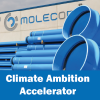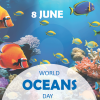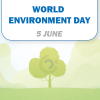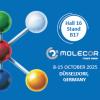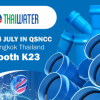
Restoring land, halting desertification and strengthening resilience to drought are the main issues to be highlighted on this World Environment Day, in which Molecor continues its commitment to sustainability and care for the environment.
Our Lands. Our future. Our contribution
This year's theme is “Our lands. Our Future. We are the #RestorationGeneration” and is that, as mentioned by the United Nations, ‘we cannot go back in time, but we can grow forests, revitalize water sources and restore soils’, in support of these causes Molecor has carried out two key environmental actions: 600 trees have been planted between Madagascar, Tanzania and Thailand, and the installation of a solar pump in a well in Madagascar has been financed.
Trees that are part of the called Molecor Forest, an important initiative that will not only help protect biodiversity and mitigate climate change, as this forest will allow the absorption of 227 tons of CO₂ from the atmosphere; but will also generate enormous benefits for the people who live in it, as it has worked directly with NGOs and local communities to select which should be the right trees and places and, especially, the right purpose: to promote sustainable development.
This initiative will also demonstrate Molecor’s contribution to the achievement of several of the Sustainable Development Goals, such as SDG 13 Climate change action and SDG 15 Life of terrestrial ecosystems.
Our most environmental commitment
For another year, on June 5, we celebrate the World Environmental Day, the most important date to make balance of our contribution to the environment and sustainability, and Molecor continues with its firm commitment to create a more sustainable future.
The planning of the company’s Sustainability Strategy is one of its most highlighted actions. Among its main ambitions, it has been marked the commitment to be one of the NetZero companies by 2040, and with it, a Decarbonization Plan has been developed to achieve it.
Furthermore, one year has passed since it was awarded the Spanish and Sustainable Plastics Industry seal by ANAIP (Spanish Association of Plastics Industrialists). This EU certification Brand recognizes the Company’s efforts as a company in the sector that comply with the environmental and socioeconomic standards that are necessaries to manufacture and be sustainable at same time.
As Molecor is an #commitedindustry to the preservation of ecosystems, including the marine environment, it has developed the implementation and certification of all production plants in Spain within the voluntary program Operation Clean Sweep (OCS), which aims to prevent the environmental pollution due to unintentional release of microplastics. The certification has been carried out according to the requirements of the new European scheme, known as OCS Europe, and in this way, Molecor is ahead to give the compliance to the duties caused by the new legislation about the matter that is being developed by the European Union.
Caring for the planet can be done from different ways and awareness and responsibility about energy use and consumption is one of them. An example of this can be found with the recent obtaining of the Energy Management System certification according to ISO 50001:2018 standard in its production plant in Loeches, and the current implementation in the centers of Getafe, Alovera, Alcázar de San Juan and Antequera.
A new certification that allows us to identify the energies uses and consumptions of the manufacturing plant, whose continuous energy monitoring and review of the energy baseline will provide us with key information to be able to stablish energy saving measures in the most significant equipment and thus improve the energy efficiency and performance of our facilities.
Calculation and elaboration of the organization’s carbon footprint report is also another perspective on Molecor’s strong environment commitment, and the company is calculating the greenhouse gases emitted by direct or indirect effect from the development of the organization's activity for the years 2022 and 2023 using the well-known Greenhouse Gas Protocol Corporate Standard (GHG Protocol) quantification methodology. Obtained results will be available in the next weeks, but it’s a powerful tool to know which are the company’s main consumptions and which are the ones that produce more emissions in order to apply different measures to reduce them and our carbon footprint.
Manufacturing and development of certain products of PVC-O with unique technology based on air, are the key to Molecor’s success, and it has proved that TOM® pipes and ecoFITTOM® fittings of PVC-O, are the greenest solution among those available on the market.
Products that present a minor energy consumption over their long-life cycle and less greenhouse gas emissions to the atmosphere, which contributes to a lower carbon footprint than alternative materials, as well as having a lower impact on climate change.
Proof of this, is the recent Environmental Product Declaration (EPD) for three of the most significant products in our wide range of PVC plastics solutions for water conveyance: AR® Soundproof Evacuation System, TOM® Pipes and ecoFITTOM® fittings in Oriented PVC, and SANECOR® Corrugated PVC System.
Voluntary certifications that show the company's solid commitment to sustainability and the evaluation of the impact of its activities in the field of plastic pipes, and that accredit the veracity of the information published by Molecor on these products in relation to their greenhouse gas emissions, energy consumption or the use of resources, among other environmental parameters.
EPDs or Type III ecolabels have been developed according to EN ISO 14025 standard, which defines the requirements for this type of environmental label and were prepared based on the Product Life Cycle Assessment according to ISO 14040 and ISO 14044 standards. In addition to being carried out from cradle to grave, they provide information about the environmental impact of the products since their extraction phase of raw materials until their final disposal, including all the stages of manufacturing, distribution, installation and use.


